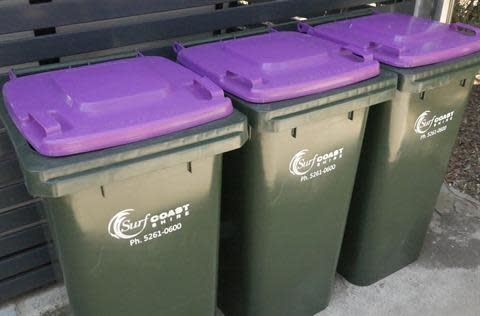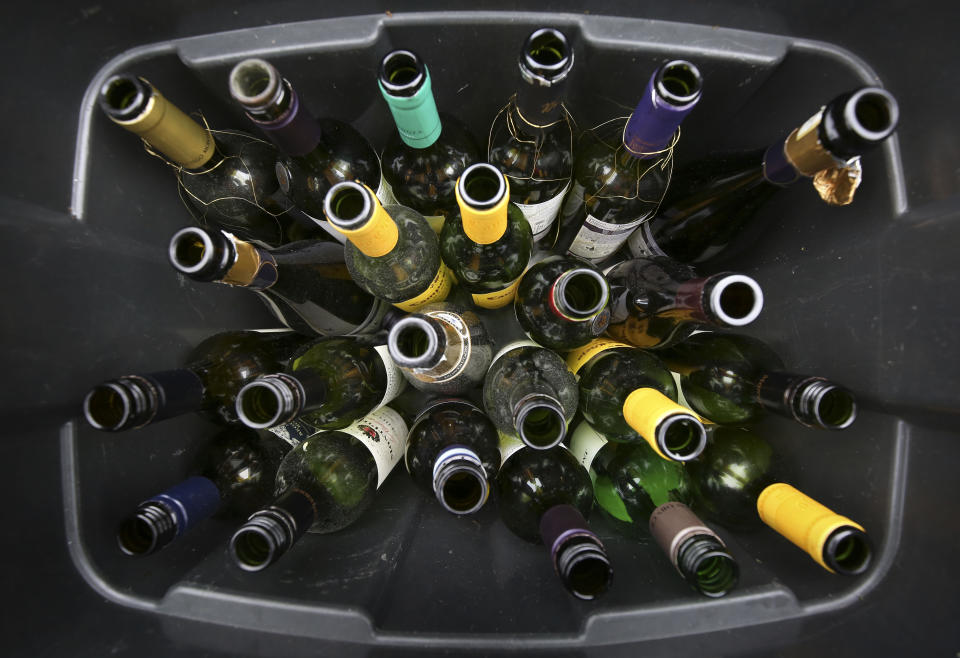More Australians facing recycling overhaul with new purple bin
More Australians will soon need to rethink how they recycle their waste with another Victorian council introducing a fourth bin to improve the standard of recyclable waste.
The new purple-lidded bin for Victoria’s Surf Coast Shire will be exclusively used for recycling glass items.
Residents will also have one bin for paper, aluminium and plastic recyclables, another bin for general waste, and a green bin for garden waste and food scraps so that food waste becomes compost and mulch and not landfill and greenhouse gases.
To help in the disposal of food scraps, homes will be given a small kitchen bin to be used to hold food waste before it’s transported to the green kerbside bin.
The additional purple-lidded bin will be introduced later this year by the Surf Coast council, south of Geelong, following trials which commenced late last year.
The reason behind the glass-only recycling bin is due to the frequency with which broken glass can contaminate other recyclable waste, causing it to potentially end up in landfill.

“Keeping glass separate from other recyclables has a huge impact on the quality of other recyclable materials,” Cr David Bell said when announcing the trial in November.
“Glass can break when it is dropped into the kerbside bin, again as recyclables are being compacted in the truck and again during processing at the sorting facility. The broken pieces contaminate paper, cardboard, plastic and metal, making them less valuable and harder to recycle,” he told the Surf Coast Times.
The change comes as councils around the country grapple with how to best deal with recyclable waste after China and other Asian countries stopped importing Australia’s waste, and even began returning shipments of recyclable materials due to contamination.
It’s likely more Victorian councils will follow suit with their own changes to how recyclable material is collected. A recent report by Infrastructure Victoria which aimed at providing solutions to the state’s recycling crisis, suggested a possible six bin system to avoid contaminated waste.
Other Victorian councils, including Hobsons Bay Council and Melbourne’s Yarra City Council, already introduced the purple glass bin last year.

Crackdown on ‘wish cycling’
Waste and environmental experts say the current system where various forms of recyclable waste are co-mingled in a single bin, still used in a majority of council areas around the country, is outdated.
For years, industry experts have been warning against a phenomenon it has dubbed “wish cycling” where people – either lazily or optimistically – put items in the recycling bin that don’t belong.
In a 2018 Senate Environment Committee report one of Australia's largest recycling companies, Visy, lamented the household habit, saying it “may doom tonnes of other recyclable items to waste”.
“Wish-cycling is the phenomenon of tossing anything and everything that could possibly, maybe, sort of be recycled into the recycling bin,” the company explained.
According to the Department of Environment’s National Waste Report 2018, Australians produced 67 million tonnes of waste in 2016-2017. Of that, 37 million tonnes were recycled.

Households divided over idea of extra bin
For those in the Surf Coast Shire council area, the organics bins will be collected weekly, the recycling and landfill bins will be collected on alternating fortnights, while the glass bin will be collected just once every four weeks.
Trial participant Nicola Muxworthy from Lorne said her household barely filled the glass bin by collection time.
“Even though there are seven of us, we don’t generate much glass, just a few wine bottles and the odd jar,” she told the council.
“While I think it is a great idea and it is easy to separate the glass for the bin, it is still an extra bin to be keeping on our property.”
While some councils already have four bins, for those in more congested cities, the idea of housing another sizeable recycling bin seemed to divide opinion. In a Facebook post Monday, ABC Sydney asked its readers if they thought Sydney should follow suit and include a fourth bin – but some residents weren’t so sure it would be practical.
“How much space do the councils think we have?? Space here in the city is expensive,” one person replied.
“Looking through my apartment buildings bins and the majority can't even cope with two choices,” another responded.
“It would be great as an option that you could opt into. Many of us already have a compost heap at home, but for those in units, it’s a great idea,” one person said, referring to using the green bin for organic waste.

Victoria announces container deposit scheme
Victoria will get a container deposit scheme to tackle the state's recycling and waste crisis, but not until 2023.
Premier Daniel Andrews announced on Monday that the scheme would be introduced as part of a “massive overhaul of our state's recycling industry.”
Environment Minister Lily D'Ambrosio also took to Facebook this morning to announce it will be in place by 2023 but neither politician released details on what form the state-wide program will take.
“This will reduce the amount of plastic and waste that goes to landfill. It will give a second, third and fourth life to beverage containers. It will reduce litter. And it will mean businesses have an ongoing source of recycling material to turn into new products,” she said.
“This is just the first of a suite of reforms to Victoria's recycling industry.”
Victoria is currently the only state or territory in Australia not to offer a cash-for-bottles scheme.
Do you have a story tip? Email: newsroomau@yahoonews.com.
You can also follow us on Facebook, Instagram and Twitter and download the Yahoo News app from the App Store or Google Play.



